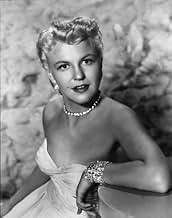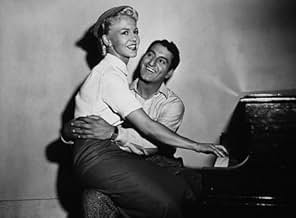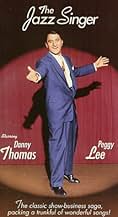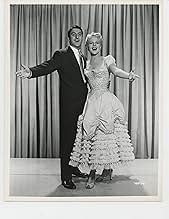Jerry rêve de devenir un célèbre chanteur de jazz. Pour y parvenir, il doit défier son père, un chantre juif, qui s'oppose à un tel destin pour son fils.Jerry rêve de devenir un célèbre chanteur de jazz. Pour y parvenir, il doit défier son père, un chantre juif, qui s'oppose à un tel destin pour son fils.Jerry rêve de devenir un célèbre chanteur de jazz. Pour y parvenir, il doit défier son père, un chantre juif, qui s'oppose à un tel destin pour son fils.
- Réalisation
- Scénario
- Casting principal
- Nommé pour 1 Oscar
- 1 nomination au total
Murray Alper
- Taxi Driver
- (non crédité)
Jimmy Ames
- Music Store Proprietor
- (non crédité)
Avis à la une
Rich looking redo of the legendary Jolson film that revolutionized the film industry ushering sound in and silence out.
The thing is that it was the technology that was the big deal about the film not the story which is pure hokum. However that seems to be something that the studio chose to ignore assuming the name recognition of the title would draw the crowds. The film did okay but it's a cornball exercise from start to finish. The main story was dated in '27 and is certainly no fresher in '52.
Danny Thomas just didn't have the strength of personality to make it on the big screen. Watching him it becomes apparent why he made it on TV and not cinema. He has a nice, likable demeanor, the sort that worked so well for Perry Como and Dinah Shore when they likewise abandoned the big screen for the small, but he doesn't dominate his scenes the way a leading man has to. He does sing well although not nearly well enough to be the rage of New York he's supposed to be.
That master of all genres Michael Curtiz moves the movie along well enough but it's too schmaltzy for him to be able to make it really memorable.
Putting all that aside the best reason to catch the film is the presence of Peggy Lee in the cast. This was her acting debut and while she doesn't have the instantly easy relaxed acting style of Doris Day the role doesn't put big demands on her, she did much better a few years on in Pete Kelly's Blues. It doesn't matter though when she sings which fortunately is often. When she does that all the hokeyness melts away and the viewer is treated to a legend doing what she does best, sing. An extra bonus is that she performs one of her biggest hits, Lover, in an elegant club setting giving you an idea of what it was actually like to see her in person.
Worth catching for Miss Lee but the story is sappy.
The thing is that it was the technology that was the big deal about the film not the story which is pure hokum. However that seems to be something that the studio chose to ignore assuming the name recognition of the title would draw the crowds. The film did okay but it's a cornball exercise from start to finish. The main story was dated in '27 and is certainly no fresher in '52.
Danny Thomas just didn't have the strength of personality to make it on the big screen. Watching him it becomes apparent why he made it on TV and not cinema. He has a nice, likable demeanor, the sort that worked so well for Perry Como and Dinah Shore when they likewise abandoned the big screen for the small, but he doesn't dominate his scenes the way a leading man has to. He does sing well although not nearly well enough to be the rage of New York he's supposed to be.
That master of all genres Michael Curtiz moves the movie along well enough but it's too schmaltzy for him to be able to make it really memorable.
Putting all that aside the best reason to catch the film is the presence of Peggy Lee in the cast. This was her acting debut and while she doesn't have the instantly easy relaxed acting style of Doris Day the role doesn't put big demands on her, she did much better a few years on in Pete Kelly's Blues. It doesn't matter though when she sings which fortunately is often. When she does that all the hokeyness melts away and the viewer is treated to a legend doing what she does best, sing. An extra bonus is that she performs one of her biggest hits, Lover, in an elegant club setting giving you an idea of what it was actually like to see her in person.
Worth catching for Miss Lee but the story is sappy.
This is the second version of the much-filmed tale of the Jewish boy who wants to sing modern music, rather than becoming a cantor in the synagogue. This time, the character is called Jerry Golding and is played by Danny Thomas, a second-string singer and comedian of the fifties, perhaps best known for his TV series.
The story itself is sparse, but Thomas gets a chance to put across some swing numbers (one or two in the company of his lady friend Judy Lane, played by the sparky Peggy Lee, in a role originally planned for Doris Day). As Golding's parents, Eduard Franz and Mildred Dunnock give good value as they struggle to understand the culture clash which has seen their son look for fame as a popular crooner.
A minor film, and one not helped by the humorous approach (perhaps to accommodate Thomas's particular style). But, this version of 'The Jazz Singer' is as good a way as any to spend a Sunday afternoon.
The story itself is sparse, but Thomas gets a chance to put across some swing numbers (one or two in the company of his lady friend Judy Lane, played by the sparky Peggy Lee, in a role originally planned for Doris Day). As Golding's parents, Eduard Franz and Mildred Dunnock give good value as they struggle to understand the culture clash which has seen their son look for fame as a popular crooner.
A minor film, and one not helped by the humorous approach (perhaps to accommodate Thomas's particular style). But, this version of 'The Jazz Singer' is as good a way as any to spend a Sunday afternoon.
The Jazz Singer is one of a number of films made in the late 1940's and 1950 about the Jewish experience in the United States. Other than Crossfire(1947) and Gentleman's Agreement(1947) which dealt with anti-semitism they usually had a musical-theatre background. These films included The Jolson Story(1946), Jolson Sings Again(1949), The Eddy Duchin Story(1951), The Eddie Cantor Story(1953),The Benny Goodman Story(1956) and Margorie Morningstar(1958). The leading actors in these "Jewish" films were always played by non-Jews. For example Larry Parks a non-Jew played Al Jolson and Gene Kelly played Noel Airman in Marjorie Morningstar. This casting was probably done to make the Jewish theme palpable to a mainly non-Jewish audience. The Jazz Singer(1952) is no different. Danny Thomas was a devout Catholic and Peggy Lee was certainly not Jewish although she plays a non-practicing Jewess in the film. The clue to her background is when she attends the Golding's family meal before entering she says "I haven't been to a sader (passover service) since I left home".
The film is about a cantor's son who has just left the service after seeing action in Korea. His dilemma is whether to become a cantor, a family tradition or to be a singer in musical theatre. His choice of theatre leads to an inevitable conflict with his father.
However, there is much more to this film than this. This film was made after the Rosenberg trial during the McCarthy whitchhunts and the Hollywood blacklist. Therefore in this film the Jews are shown as good loyal citizens and
are quintessentialy American. The synagogue choir would rather play baseball than practice. The cantors friends also talk about baseball in fact one of them is a Major League umpire. The synagogue itself dates back to 1790 and George Washington is said to have visited. Therefore Jews are presented as part and parcel of American society. Nobody in this film has a Eastern European accent. Peggy Lee appeared in very few feature films. In this film you get to see her sing "Lover" and "Just One of Those Things" wonderful. Danny Thomas is quite credible and he acts and sings the part very well. The comedic routines could have been left out. Yes, the film is schmaltzy and sentimental but it is well worth seeing. I enjoyed it very much.
The film is about a cantor's son who has just left the service after seeing action in Korea. His dilemma is whether to become a cantor, a family tradition or to be a singer in musical theatre. His choice of theatre leads to an inevitable conflict with his father.
However, there is much more to this film than this. This film was made after the Rosenberg trial during the McCarthy whitchhunts and the Hollywood blacklist. Therefore in this film the Jews are shown as good loyal citizens and
are quintessentialy American. The synagogue choir would rather play baseball than practice. The cantors friends also talk about baseball in fact one of them is a Major League umpire. The synagogue itself dates back to 1790 and George Washington is said to have visited. Therefore Jews are presented as part and parcel of American society. Nobody in this film has a Eastern European accent. Peggy Lee appeared in very few feature films. In this film you get to see her sing "Lover" and "Just One of Those Things" wonderful. Danny Thomas is quite credible and he acts and sings the part very well. The comedic routines could have been left out. Yes, the film is schmaltzy and sentimental but it is well worth seeing. I enjoyed it very much.
Oy gevalt! What a disaster! Danny Thomas croons (badly), Danny Thomas tells jokes (badly) that are so corny and ancient Al Jolson would have been embarrassed to crack them, Danny Thomas emotes (badly, almost laughably). Opening scene had me wondering what all those goyim were doing in the temple! Peggy Lee was entertaining and a standout in this otherwise dreary film. The supporting cast were more-or-less adequate, with the mother and father characters well cast. Look for character actor William Schallert in a bit part, along with some other familiar faces. The Technicolor photography was superb. Watch all the scenes taking place in clubs across the nation and you'll notice that Danny and Peggy are using the exact same microphone in each one! My advice - stick with Jolie's groundbreaking original.
By 1952 Hollywood decided to remake the Al Jolson first-talking classic.
This time the Cantor's son was played by Danny Thomas. Coming home from the army, it is expected that he follow in the footsteps of his father and other male relatives by becoming a cantor. However, young Mr. Golding has quite a zest for show business.
At this time, he meets Peggy Lee, an aspiring singer. She acts very well and her rendition of her favorite song, Lover, is remarkable. The film writers were smart not to plug the obvious Jewish guy and non-Jewish girlfriend relationship. If anything, this is glossed over. In his anger, for betraying his pledge to become a cantor, his father makes the traditional Jewish sign indicative of a loss in the family. This would not be done under circumstances of breaking a pledge, it would be done if among the orthodox, an inter-faith marriage would take place.
Thomas does a really good job of playing the cantor's son. His singing is up to par as the film ends on a positive note.
Am surprised that technical advisers did not realize that women do not carry pocketbooks into synagogue on the sabbath or at all during that period.
This time the Cantor's son was played by Danny Thomas. Coming home from the army, it is expected that he follow in the footsteps of his father and other male relatives by becoming a cantor. However, young Mr. Golding has quite a zest for show business.
At this time, he meets Peggy Lee, an aspiring singer. She acts very well and her rendition of her favorite song, Lover, is remarkable. The film writers were smart not to plug the obvious Jewish guy and non-Jewish girlfriend relationship. If anything, this is glossed over. In his anger, for betraying his pledge to become a cantor, his father makes the traditional Jewish sign indicative of a loss in the family. This would not be done under circumstances of breaking a pledge, it would be done if among the orthodox, an inter-faith marriage would take place.
Thomas does a really good job of playing the cantor's son. His singing is up to par as the film ends on a positive note.
Am surprised that technical advisers did not realize that women do not carry pocketbooks into synagogue on the sabbath or at all during that period.
Le saviez-vous
- AnecdotesMichael Curtiz originally wanted Doris Day to play the role of Judy Lane.
- GaffesCatwalks, lights and other equipment rigged to the roof of the sound stage are clearly visible during a shot of an audience supposedly sitting in a real theater.
- ConnexionsReferenced in Make Room for Daddy: Linda, the Performer (1960)
Meilleurs choix
Connectez-vous pour évaluer et suivre la liste de favoris afin de recevoir des recommandations personnalisées
- How long is The Jazz Singer?Alimenté par Alexa
Détails
- Date de sortie
- Pays d’origine
- Langue
- Aussi connu sous le nom de
- Jazz Singer
- Lieux de tournage
- Société de production
- Voir plus de crédits d'entreprise sur IMDbPro
Box-office
- Montant brut aux États-Unis et au Canada
- 4 360 000 $US
- Durée1 heure 47 minutes
- Rapport de forme
- 1.37 : 1
Contribuer à cette page
Suggérer une modification ou ajouter du contenu manquant

Lacune principale
By what name was The Jazz Singer (1952) officially released in Canada in English?
Répondre

































